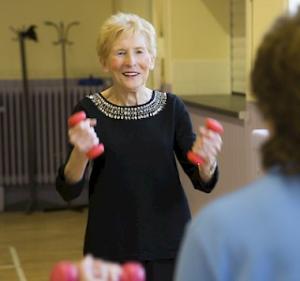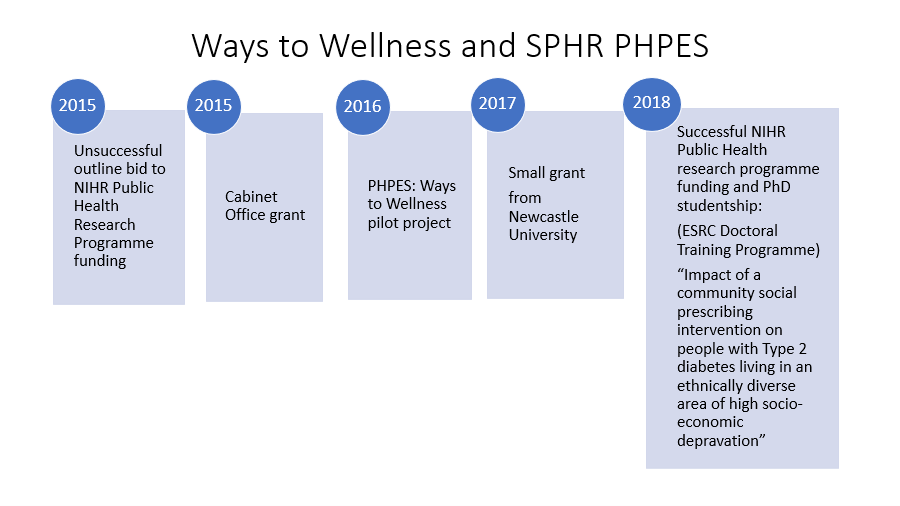Research capacity development
Ways to Wellness: study of the impact of a social prescribing intervention

Funding from the NIHR School for Public Health Research developed partnerships and research capacity, leading to further successful grant applications into health inequalities research and a PhD studentship.
Despite being widely supported by NHS and General Practice strategies, there was a lack of evidence for the impact of social prescribing on health. To address this gap, a research team including Fuse researchers and practitioners from the Ways to Wellness social prescribing project collaborated on evaluating the project’s intervention. The project was linked to seventeen general practices in the West End of Newcastle-upon-Tyne where there were high levels of poverty and ill-health. Service users from GP practices, who had long-term health conditions such as diabetes or heart conditions, were referred to community and voluntary services such as walking groups, art classes or welfare rights advice.
The NIHR SPHR Public Health Practice Evaluation Scheme (PHPES) enables public health professionals to work in partnership with School researchers to conduct rigorous evaluations of their interventions. Fuse researchers and practitioners initially applied for PHPES funding in 2015. This bid was unsuccessful. However, PHPES put out a call for rapid responses for funding short term bids, and a revised 'cut down' proposal was funded for a nine month period. The feasibility study aimed to find out how possible it would be to collect self-completion questionnaire data from people referred into the social prescribing service, and whether there was any change in health outcomes after three months.
Over half the participants reported problems with quality of life and managing their health, but after attending Ways to Wellness, improvements were found across all measures, particularly with self-care, pain and discomfort. Those aged 60-74 reported much greater levels of improvements.
The feasibility study produced valuable lessons about the challenges of collecting data on interventions that are delivered by voluntary and community sector organisations and concluded that future research on a larger scale was required to assess when, and for whom, social prescribing was clinically and cost effective. The PHPES application process and funding had several benefits for building research capacity. The process strengthened the collaborative partnership between Ways to Wellness practitioners and Fuse researchers. The funding into the feasibility study provided evidence on data gathering methods in the context of voluntary and community sector intervention delivery, and gave opportunities for the research team to develop these methods in a future bid. This led to further success in building research capacity and reducing evidence gaps by:
The PHPES application process and funding had several benefits for building research capacity. The process strengthened the collaborative partnership between Ways to Wellness practitioners and Fuse researchers. The funding into the feasibility study provided evidence on data gathering methods in the context of voluntary and community sector intervention delivery, and gave opportunities for the research team to develop these methods in a future bid. This led to further success in building research capacity and reducing evidence gaps by:
- Securing a further grant from Newcastle University Institute of Ageing and Social Renewal
- A successful bid for an Economic and Social Research Council (ESRC) Doctoral Training Programme PhD studentship
- A successful bid to the National Institute for Health Research (NIHR) Public Health Research (PHR) Programme Grant on community based interventions to reduce health inequalities: Impact of a community social prescribing intervention on people with type 2 diabetes living in an ethnically diverse area of high socio-economic deprivation.
Dr Suzanne Moffatt described in her blog that the success of this bid was due to the substantial body of underpinning research, including PHPES funding and an excellent team of researchers.
SPHR funding, such as the PHPES scheme, forms an essential springboard for Fuse researchers to develop their research expertise, consolidate collaborative partnerships with practitioners, and build underpinning evidence towards funding success for larger, more complex projects.
Fuse Open Science blog:
If at first you don’t succeed, try, try, try and try again...
News:
A prescription of activities shown to improve health and well-being
SPHR website:
Ways to Wellness: feasibility study of the impact of a social prescribing intervention
Linked SPHR themes/programs:
Public Health Practice Evaluation Scheme (PHPES)
Image: 'bsc_film_exercise_class_2_copy.320x300' courtesy of Ways to Wellness: https://waystowellness.org.uk
Last modified: Tue, 26 Jan 2021 22:27:39 GMT





